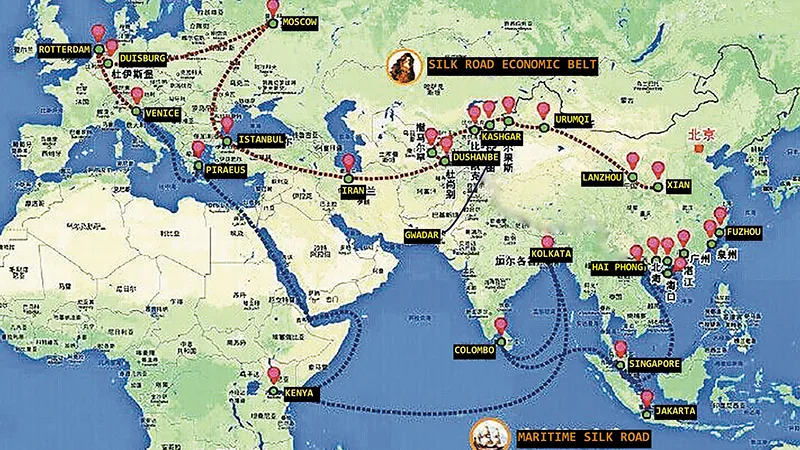 This is the 90th article in the series
This is the 90th article in the series The China Chronicles.
Read the articles here.
China’s deep pockets and its ability for swift action have allowed it substantial access and influence in various capacities around the world. While this has obviously resulted in apprehensions among countries regarding the intent, form and extent of Beijing’s footprints, many countries – usually those with limited resources –accept the financial aid and the promise of development that it offers. Financial assistance is nothing new in international politics but assistance from China engenders disquiet primarily because of the terms on which the assistance is given. Debt burdens of infrastructure projects which turn out to be insurmountable are usually compensated with total control over the project in question and often also land which is alotted as collateral.
President Xi Jinping’s Belt and Road Initiative (BRI) is undoubtedly the most expansive connectivity project undertaken at the initiative of a single country. From Asia to Europe, the BRI s land and maritime networks with the objective of enhancing physical links to boost trade and fuel economic growth. At its core is the aim of acquiring access to and where possible, control over key strategic locations and securing the supply of resources. Beijing insists that the BRI is geared towards reaping economic benefits by leveraging connectivity for all members. But there are difficulties with this assertion with China facing criticisms over what is now commonly referred to as its debt trap diplomacy and predatory economics. One of the first instances of infrastructure funded by China and later taken over is the port at Djibouti which happened to become (despite initial claims to the contrary) China’s first overseas military base. Quite naturally, this raises apprehensions regarding sovereignty.
China’s expanding outreach and increasing influence have also raised questions about the future of where the balance of the world order would lie. Do most countries remain in favour of a US-led world order as has been the case over the past several decades or is there a tilt towards favouring China or a third possibility of countries settling for maintaining a balance between the two? The situation at present consists of a variable mixture of these options. Clearly, there are those who are in camp America and support the narrative of a Free and Open Indo-Pacific and stress the significance of a rules-based world order. Most others are engaged in balancing as there is a realization that China’s economic heft and engagement cannot be avoided. But, what is interesting to note is that even among those who are in the middle of this delicate act of balancing, there is recognition that caution needs to be exercised. One of the main reasons may be that there is an underlying surreptitiousness and most definitely ambiguity about Beijing’s actions.
This realization has, over the last couple of years, led some countries to renegotiate their terms of engagement with Beijing – the most recent instance being Sri Lanka. The new government in Colombo under President Gotabaya Rajapaksa announced in late November that it wants to reverse the deal made by former Prime Minister Ranil Wickremesinghe who in 2017 leased the Hambantota Port to the Chinese government for 99 years citing inability to repay the loan to build the port project. The port deal was finalized during the tenure of former President Mahinda Rajapaksa. The move by Wickremesinghe helped to write off almost USD 1 billion worth of debt for Sri Lanka while allowing China complete control over the port and the land. It is unlikely that Beijing will agree to a reversal of the deal made with Wickremesinghe as the port is a vital connection due to its proximity to the east-west shipping route and the strategic advantages it offers due to its location at the tip of the Indian Ocean. Nevertheless, the attempt at a revision of the agreement signals mounting fears regarding China’s inroads.
Sri Lanka is not the only country to raise concerns related to its national interests, which is attempting a renegotiation of agreements with China, Myanmar in 2018 scaled back the Kyaukphyu deep-sea port project which was to be funded by China and part of the Belt and Road Initiative (BRI) project allowing it preferential access according to the agreement signed in 2015. The initial cost of the port and SEZ located in the troubled Rakhine state was USD 7.3 billion has been revised and reduced to USD 1.3 billion. A country which already faces a lot of flak for ethnic conflicts, Myanmar has been trying to balance what is perceived as an over-dependence on China with concerns related the risks that may follow if the country failed to finance the repayment – similar to the experience in Sri Lanka together with uncertainties regarding the environmental impact of the project.
In Malaysia too, costs of the East Coast Rail Link (ECRL) project were reduced to two-thirds of the original cost following fresh negotiations when Prime Minister Mahatir Mohamad took office. The revision of the earlier agreement came amid domestic pressures to diversify sources of foreign direct investment in the country. The ECRL which will connect Port Klang in the west to the Kuantan port in the east is also part of President Xi’s BRI and was almost scrapped by Mahatir who later agreed to renegotiate as the cancellation fee of the project was too high. Two pipeline projects funded by China were also scrapped by the Mahatir-led government.
In the midst of these developments Japan announced that it will not the sign the Regional Comprehensive Economic Partnership (a free trade agreement among the ten member states of the Association of Southeast Asian Nations and their five FTA partners) unless India joins as well after the latter pulled out of the RCEP in November. The main push behind RCEP since 2012 has been Beijing and questions arising from Tokyo’s announcement is another indicator of a growing consensus among regional countries of the need to band together if not directly seek to contain China.
These developments do not signal the intent to dissolve ties with China. Its extensive economic engagement with most countries not only in the immediate region but also across the world cannot be ignored. However, it does indicate that it may become slightly more challenging for Beijing to exert its sharp power in the years to come.
The views expressed above belong to the author(s). ORF research and analyses now available on Telegram! Click here to access our curated content — blogs, longforms and interviews.



 This is the 90th article in the series The China Chronicles.
Read the articles
This is the 90th article in the series The China Chronicles.
Read the articles  PREV
PREV


